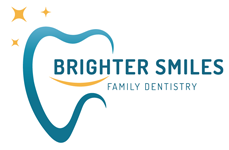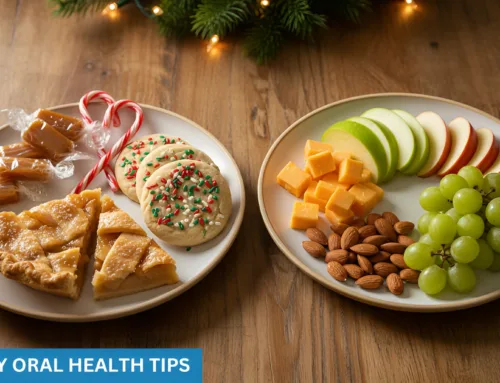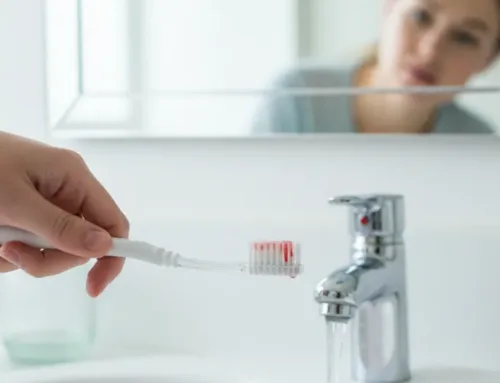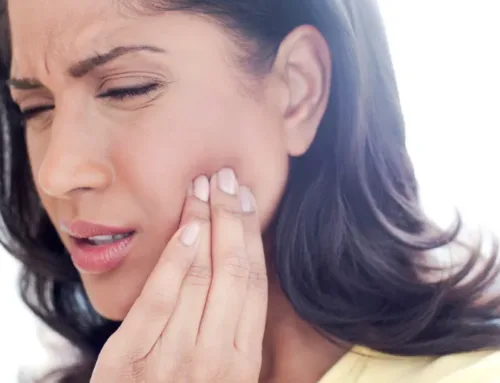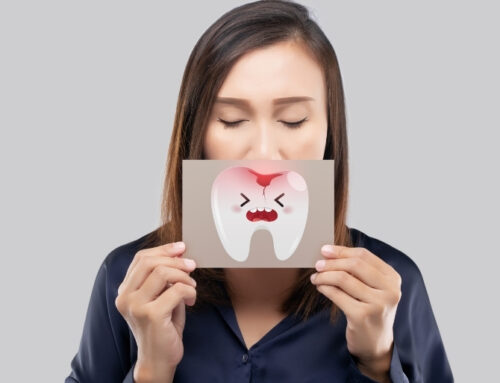Think your toothbrush is doing all the work? Think again. What you eat every day could be quietly damaging your teeth—or helping them stay strong for life.
Whether you’re battling bad breath, worried about cavities, or trying to avoid gum disease, your diet matters more than you think.
And the truth is, some of the most common foods in your pantry might be doing more harm than good.
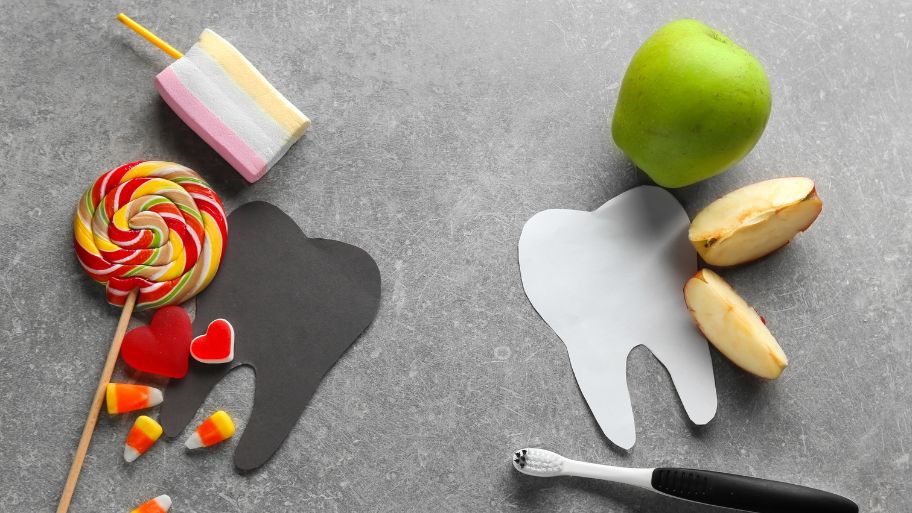
Here’s your cheat sheet to foods that cause cavities vs food for healthy gums—so you can stop guessing and start protecting your smile.
| ✅ Good for Your Teeth | ❌ Bad for Your Teeth |
|---|---|
| Cheese & plain yogurt (rebuilds enamel) | Soda, sports drinks, and sweetened beverages |
| Leafy greens (fuel gum health with vitamins A, C, K) | Sticky candies (caramels, gummies, taffy) |
| Crunchy fruits & veggies (natural toothbrush effect) | Chips, crackers, and refined carbs |
| Green tea (fights harmful mouth bacteria) | Citrus fruits (especially when sipped over time) |
| Almonds & nuts (low sugar, enamel-safe crunch) | Dried fruits (raisins, dates—worse than candy!)Dried fruits (raisins, dates—worse than candy!) |
| Water (keeps saliva flowing + rinses acids) | Frequent snacking or sipping sugary drinks |
Pro tip:
It’s not just what you eat—but how often you eat it. That can of soda or sweet treat might be quietly working against your teeth without you even noticing.
At Brighter Smiles Family Dentistry in West Des Moines, we’ve seen how diet can make or break your dental health.
This guide will show you exactly what to eat, what to avoid, and why it matters—so you can protect your teeth with every bite.
👉 Let’s break it down.
Why Your Diet Matters More Than You Think for Dental Health
Brushing helps. Flossing matters. But when it comes to lasting oral health, what you eat plays a leading role.
That’s because your teeth and gums aren’t just affected by food—they’re supported by what you feed your body. A strong enamel layer depends on nutrients like calcium, phosphorus, and vitamin D.
Healthy gums need vitamins A, C, and K to stay resilient. And saliva—the unsung hero of your mouth—needs proper hydration and nutrient support to work effectively.
Here’s how the right nutrients support your oral health:
When saliva is flowing and well-balanced, it protects your enamel, neutralizes acids, and helps wash away leftover food particles.
But when your diet is high in processed carbs or low in essential nutrients, that natural defense weakens—putting you at higher risk for decay and gum disease, even if you brush.
This is where nutrition and dental health go hand in hand. It’s not about cutting out everything fun—it’s about making smart, balanced choices that help your smile stay strong over time.
At Brighter Smiles Family Dentistry, we often remind our West Des Moines patients:
🦷 A toothbrush can clean your teeth—but only your diet can nourish them.
What Actually Causes Tooth Decay and Enamel Erosion?
Let’s break down what really happens when a cavity forms—because understanding the process helps you avoid it.
It all starts with bacteria. Your mouth is home to millions of them—some helpful, some harmful. When you eat starchy or sugary foods, harmful bacteria break them down and release acid that starts to attack your teeth.
That acid then clings to your teeth in the form of sticky plaque, slowly eating away at your enamel.
Over time, if this acid isn’t neutralized or washed away, it creates tiny holes—what we call cavities. And if left untreated, it can go deeper, reaching the dentin and even the nerve.
But it’s not just about sugar. Certain foods and habits make this process worse:
And here’s what most people don’t realize: it’s not how much sugar you eat—it’s how long it lingers.
By being mindful of what and how you eat, you can cut down those acid attacks and give your enamel time to recover between meals.
Up next, let’s talk about the best foods to add to your diet if you want your teeth to fight back.
Tooth-Friendly Foods You Should Be Eating More Of
Now that you know what causes cavities, let’s flip the script—because some foods actually work with your mouth to keep it clean, strong, and protected.
You don’t need a complicated diet to improve your dental health. Often, it’s as simple as adding more tooth-friendly foods to your plate—foods that help clean your teeth as you chew, nourish your enamel, and support healthy gums from the inside out.
Here are some smart, natural choices:
These foods aren’t just good for your overall health—they’re powerful allies for your teeth and gums. The right mix of nutrients helps your mouth repair itself and reduces the risk of inflammation, which is key for avoiding gum issues.
If you’re looking for food for healthy gums, this is where to start. A few minor adjustments to your grocery list can go a long way toward achieving a stronger, healthier smile.
Common Foods and Drinks That Are Hurting Your Teeth
You might be doing everything right—brushing, flossing, even choosing “healthy” snacks—but some foods you eat every day could still be sabotaging your teeth.
Many foods that cause cavities aren’t just loaded with sugar. They’re sticky, acidic, or eaten so frequently that your teeth never get a break.
Here are some of the biggest culprits hiding in plain sight:
The real issue isn’t just what you’re eating—it’s how and how often. Sipping soda throughout the day or snacking every hour keeps your mouth in a constant acid attack.
If you’re unsure where to start, try this:
Knowing which foods that cause cavities are in your routine is half the battle. The next half? Finding easy swaps and smarter habits—starting with what you drink.
Are Snacks and Sweets Always a Bad Thing?
Good news—you don’t have to give up every sweet or snack to protect your smile.
When it comes to diet and oral health, it’s not about being perfect. It’s about being smart. How you combine foods and when you eat them matters just as much as what’s on your plate.
Here are a few strategies that make snacking safer for your teeth:
So yes—you can still enjoy a piece of chocolate or a handful of trail mix. The key is making it part of an overall diet that supports oral health, not one that constantly challenges it.
Looking for simple ways to level up your choices even more? Let’s talk about what you’re drinking next.
What Should You Drink for a Healthier Smile?
Snacks aren’t the only thing impacting your teeth—what’s in your cup might be just as important.
Some drinks hydrate and protect. Others fuel decay and weaken enamel, even if they’re marketed as “healthy.” Understanding how beverages affect your teeth is a key part of improving your overall nutrition and dental health.
Here’s what to know:
If you want to improve your nutrition and dental health, start by making water your default drink. It’s a small shift that makes a big difference—especially over time.
At Brighter Smiles Family Dentistry in West Des Moines, we believe the best dental care doesn’t start with treatment—it starts with trust, education, and early action.
Can Chewing Gum Actually Be Good for Your Teeth?
It might sound too good to be true—but yes, the right chewing gum can actually support your smile.
When chosen wisely, sugar-free gum—especially those made with xylitol—can be a smart addition to your daily routine. It’s not a replacement for brushing, but it plays a helpful role in your overall diet and oral health.
Here’s how it works:
Not all gum is created equal, though. Here’s what to look for:
So next time you’re between meals or craving something sweet, pop in a piece of sugar-free gum. It’s a small habit that supports a much bigger goal—a cleaner, healthier mouth.
Diet Tips If You Have Cavities, Sensitive Teeth, or Gum Issues
Struggling with cavities, sensitivity, or sore gums? You’re not alone—and your diet could be the key to getting some relief.
Different oral health problems need different nutritional strategies. Here’s how you can use food to support your teeth and gums depending on what you’re dealing with:
🦷 If You’re Prone to Cavities:
- Cut back on frequent snacking and sugary drinks—even natural ones like fruit juice
- Choose tooth-friendly snacks like cheese, almonds, or apples
- Drink more water throughout the day to rinse away acids
- Chew xylitol gum after meals when brushing isn’t possible
😬 If You Have Sensitive Teeth:
- Avoid very acidic foods like citrus fruits, soda, or vinegar-based dressings
- Use a straw for cold or acidic drinks to minimize enamel exposure
- Add enamel-friendly foods like dairy, leafy greens, and nuts
- Avoid overly hot or cold foods that can trigger pain
🪥 If You’re Dealing with Gum Issues:
- Focus on food for healthy gums—like spinach, citrus fruits, and colorful veggies packed with vitamins A and C.
- Add omega-3s from sources like salmon, flaxseeds, or chia seeds to fight inflammation
- Stay hydrated to support saliva flow and overall gum tissue health
- Cut back on ultra-processed foods that may increase inflammation
With a few small tweaks, your meals can do more than fuel your body—they can help heal your mouth. And if you’re not sure where to start, your dentist can help you tailor your diet to your specific needs.
Up next, let’s take a look at how your diet doesn’t just affect your mouth—it impacts your whole body too.
How Your Diet, Mouth, and Overall Health Are Connected
Your mouth isn’t just where digestion starts—it’s also a reflection of what’s going on in the rest of your body.
When we talk about nutrition and dental health, we’re also talking about your total health. That’s because the same diet that affects your teeth and gums also impacts inflammation, blood sugar, and even your heart.
Let’s look at a few powerful links:
This is why your dentist doesn’t just care about your teeth—they care about your diet, too.
At Brighter Smiles Family Dentistry, we take a whole-person approach to care. Because when your mouth is healthy, your body has one less battle to fight.
Practical Tips for a Tooth-Friendly Diet You Can Stick With
Big changes start with small steps—and when it comes to improving your diet and dental health, even a few smart swaps can make a real difference.
Here are five simple, family-friendly ways to eat better for your teeth without overhauling your whole life:
🛒 1. Shop with your smile in mind
Make it a habit to toss in tooth-friendly staples: plain yogurt, leafy greens, crunchy fruits, unsweetened nut butter, and whole-grain options. Skip snacks that stick (literally and figuratively).
🧂 2. Rethink your pantry
Keep high-sugar “grab-and-go” snacks out of reach—or better yet, out of the house. Replace them with nuts, popcorn, cheese sticks, or apple slices for healthier alternatives.
👨👩👧 3. Make family-friendly swaps
Trade juice boxes for water infusers with fresh fruit. Sub sugar-heavy cereals for oatmeal with banana and cinnamon. These small upgrades are easy to build into any routine.
🥤 4. Watch the hidden sugars
Even “healthy” foods like granola bars, smoothies, and flavored yogurts can be packed with sugar. Check the label—and aim for snacks with less than 5g of added sugar per serving.
🗓️ 5. Stick to structured meals
Try to limit all-day snacking. Give your teeth breaks between meals to recover naturally—and if you do snack, follow it up with a rinse of water.
Improving your diet and dental health doesn’t mean giving up everything you love. It just means making choices that love your smile back.
Ready to tie it all together? Let’s wrap up with one final takeaway—and how we can help.
Final Thoughts – Better Diet, Brighter Smiles
Here’s the bottom line: your toothbrush can only do so much. A brighter smile begins with the decisions you make during meals.
From what’s in your grocery cart to how often you snack, your daily habits shape the future of your teeth and gums. And the best part? You don’t have to do it perfectly—you just have to start.
Every smart choice adds up. With the right balance of nutrition, timing, and support, you’re not just avoiding cavities—you’re building a foundation for lifelong oral health.
💡 Need personalized guidance?
At Brighter Smiles Family Dentistry in West Des Moines, we don’t just fix smiles—we help you protect them for life. Whether you’re looking to improve your oral health through smarter eating or want expert dental care tailored to your needs, we’re here to help.
👉 Schedule your visit today and let’s talk about your smile—and your diet.

About the Author
Brighter Smiles Family Dentistry, led by Dr. Melani Fulton, upholds a legacy of exceptional dental care in West Des Moines, IA. Dr. Fulton, a University of Iowa College of Dentistry alumna, specializes in family dentistry and orthodontics. She succeeded Dr. Dan Todd in 2021, continuing a tradition of patient-centered, high-quality dentistry. Committed to gentle, modern treatments, Dr. Fulton’s approach is deeply rooted in community values, ensuring every patient feels like family at Brighter Smiles.
